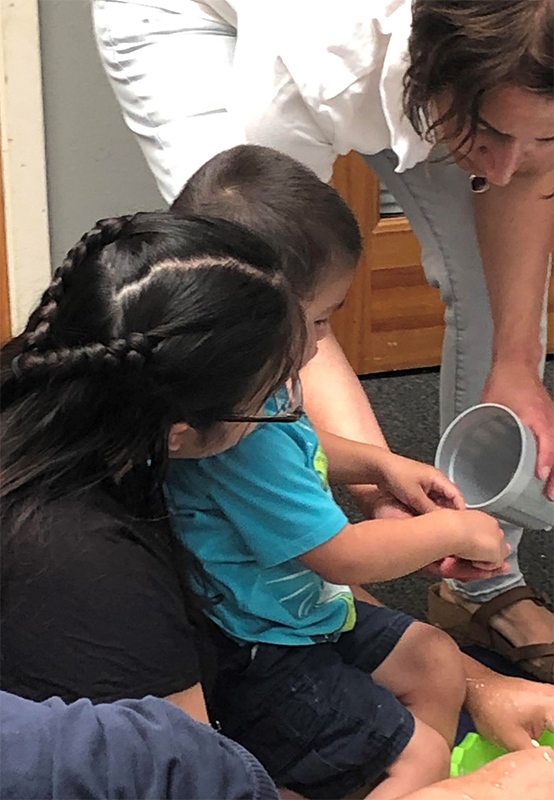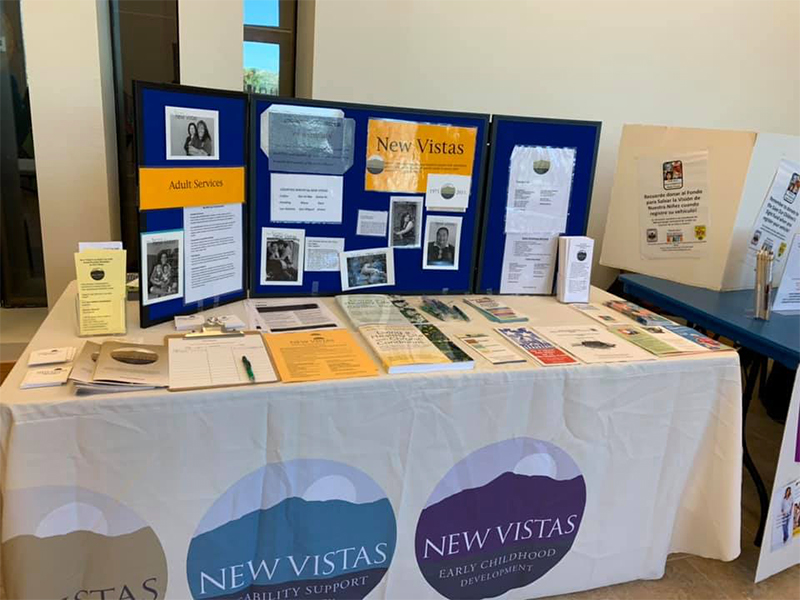Early Intervention Program
Many parents bring us questions and concerns about their child’s development.
Parents often wonder about certain skills and behaviors observed in their child. Common questions like: Is this typical for their age? Should I just wait and see? What should I be looking for? Shouldn’t my child be sleeping through the night, sitting up, walking, or talking by now? These questions are good. They are the signs of an attentive and caring parent— the important thing is to find the answers and support you need.
- Parenting Education & Support
- Speech, Physical & Occupational Therapy
- Service Coordination & Case Management
- Family Counseling
- Health Services
- Nutritional Counseling
- Social Work Services
- Parent to Parent Linkages
- Lending Library
First we watch and evaluate your child. We study how they interact with their environment, parents and other people in their surroundings. We use our findings to tailor a program specifically to your child’s and family’s needs.
Early intervention helps your child
Parents often wonder about certain skills and behaviors observed in their child. Common questions like: Is this typical for their age? Should I just wait and see? What should I be looking for? Shouldn’t my child be sleeping through the night, sitting up, walking, or talking by now? These questions are good. They are the signs of an attentive and caring parent— the important thing is to find the answers and support you need.
Early intervention really works
According to the US Department of Education and over 50 years of research, evidence shows that early intervention increases the developmental and educational gains of a child. With intervention at birth or soon after the diagnosis of a disability (or high risk factors), the likelihood of developmental problems is significantly reduced.
Early intervention supports families
“What I appreciate most about New Vistas is the entire team’s commitment to my child. Everyone we have worked with has a universally high level of skill and offers impressive support.” – New Vistas Parent
“Before we started with New Vistas I wondered if my child experienced much joy. Now it is unmistakable that he is a very happy and joyful child. I attribute much of this to the opening up his therapy has allowed him. They truly helped me to better understand my child.” – New Vistas Parent
Average Development Stages
1–3 Months
Grasp small objects that are placed in their hands. Lift their heads briefly when on their tummy. React to sudden movements or noises. Follow moving objects with their eyes. Make sounds such as “cooing.” Smile when they’re played with.
3–6 Months
Turn their heads toward sounds such as a bell or voice. Lift their head and chest when on their tummy. Make babbling sounds such as “ee”“ih” or “uh.” Recognize familiar objects and people. Reach for and hold objects. Laugh or chuckle. Roll over.
6–9 Months
Sit by themselves when placed in a sitting position. Roll from their tummy to back and back to their tummy. Use crying to show different needs like hunger or anger. Play simply games like peekaboo and pat-a-cake. Make sounds such as “bab”,“gugu” or “didi.” Differentiate strangers from family. Pass objects from hand to hand. Feed themselves a cracker. Creep on their tummy.
9–12 Months
Copy sounds and words such as “Mama” and “Dada”. Understand simple words like “Mommy,” or “Bye-bye”. Pay attention to simple commands like “Give it to me.” Pull themselves to a sitting and/or standing position. Creep or crawl, perhaps backwards at first. Pick things up with their thumb and forefinger. Simple stacking of blocks or objects. Know their own name.
12–15 Months
Turn two or three pages at a time. Walk by holding onto furniture. Drink with a cup using two hands. Eat with a spoon. Build and stack objects. Talk nonsense words. Say two or more words besides “Mama” and “Dada.” Understand more of what is being said to them. Play by themselves.
15–18 Months
Imitate simple actions such as cleaning and reading. Point to simple pictures such as dog, baby and car. They can often walk upstairs with help. Throw a ball without falling. Ask for help when needed. Scribble with crayons. Push and pull toys. Imitate simple words. Walk independently.
18–24 Months
Walk well. They may begin to run. Play for longer periods of time. Put squares and circles into puzzles. Recognize themselves in a mirror or pictures. Combine two or more words (“Play ball,” “Me want cookie”). Say “no” to bedtime, certain foods and simple requests. Enjoy moving to music. Climb stairs.
24–30 Months
Jump, run, kick a ball, walk up and down stairs. Help with dressing and undressing themselves. Play with other children, usually for short periods of time. Feed themselves well with a spoon. Point to four or five parts of the body. Speak in short sentences. Name objects in books. Turn pages one at a time. Know some colors.
30–36 Months
Early intervention Program Details
How We Work
We watch and evaluate your child. We study how they interact with their environment, their parents and other people in their surroundings. We use our findings to tailor a program specifically to your family’s needs.
Families have access to staff representing multiple disciplines who work alongside of them to support their child’s development and learning within and across all daily activities. The use of everyday routines, activities and places as a context for early intervention services provides numerous ways to incorporate skills into the child and family’s life.
Services We Provide
• Parenting Education & Support
• Speech, Physical & Occupational Therapy
• Service Coordination & Case Management
• Family Counseling
• Health Services
• Nutritional Counseling
• Social Work Services
• Parent to Parent Linkages
• Lending Library




